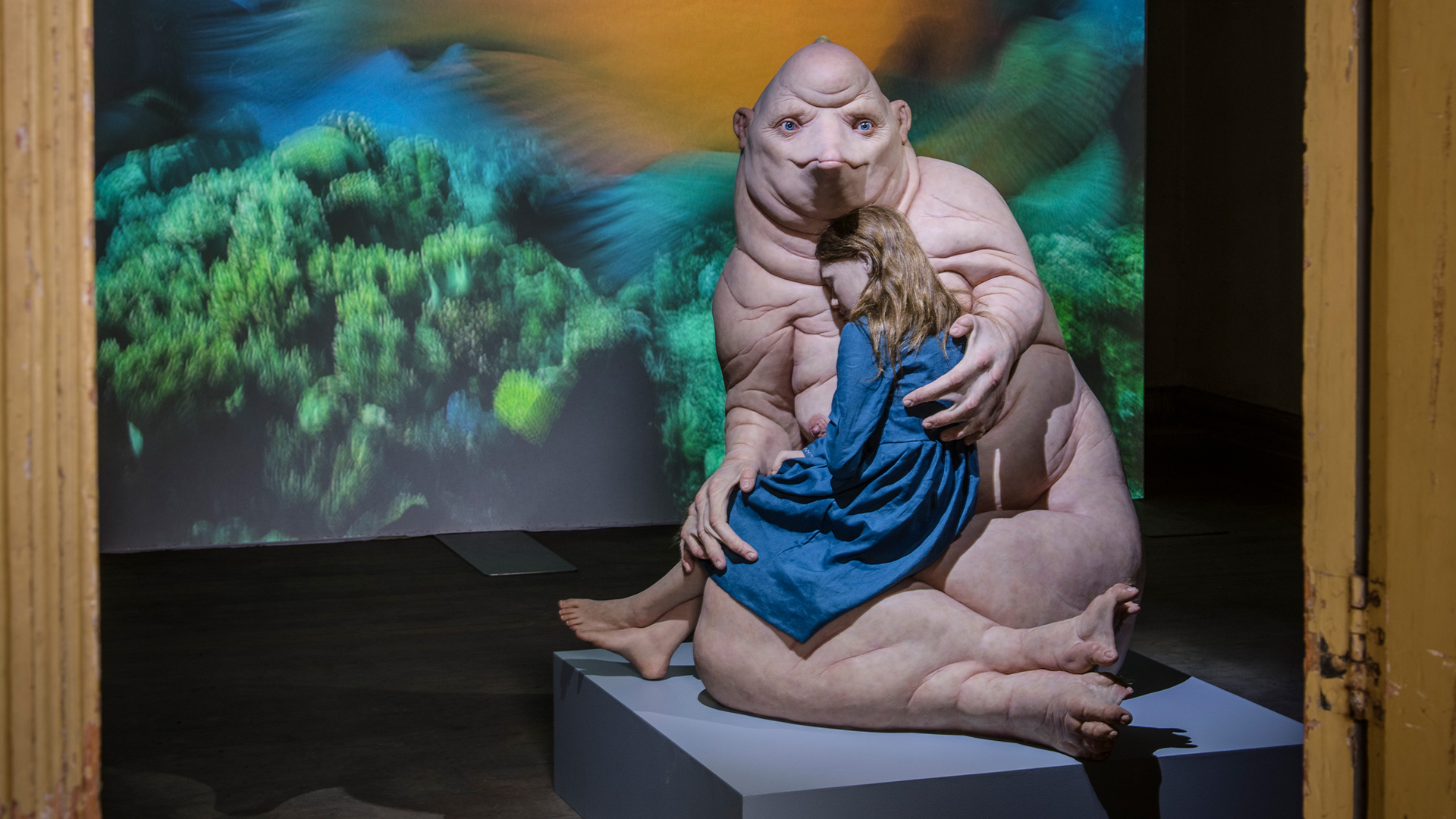
Patricia Piccinini’s Unconditional Love
For A Miracle Constantly Repeated, the landmark takeover of Flinders Street Station’s hidden third level, Patricia Piccinini has created a world built on care, empathy and resilience. As well as these themes, her works suggest a future built on nurture and co-existence.
Flinders Street Station is a nexus point between man and machine, the landscape and engineering. Its trains and tracks help us accomplish speed beyond the possibilities of our own physiology. But convenience and has come at the cost of the Birrarung river’s scarred banks.
Learning how to approach nature’s permutations with care, while living with the technologies that facilitate our lives, is the thematic heart of Patricia Piccinini’s A Miracle Constantly Repeated—the artist’s first-of-its-kind takeover of Flinders Street Station’s decades-hidden third level and ballroom.
Nurture Nature
Existing in Piccinini’s world are human-animal hybrids, and chimeras that bridge the gap between the organic, mechanical and sentience. Surrounded by the station’s peeling paint, in rooms that were once sites of community congregation and collective joy, her creations and their human companions are visions of care, intimacy and inter-species companionship.
In No Fear of Depths, 2021—which in her personal audio guide Piccinini describes as the exhibition’s most personal work—a chimera based on the Australian humpback dolphin cradles a prepubescent girl, in a maternal embrace.
“This work is special to me because it’s a realistic portrait of my daughter Roxy, just before she started the journey to adulthood,” says Piccinini. “I feel that the role that women play culturally as mothers and carers has put care on the wrong side of an important/not important dichotomy in our culture, yet care is what we need now, more than anything. What does it matter about profit, or even new technologies, if there is no planet to live on? I think the humpback dolphins would get that.”

No Fear of Depths by Patricia Piccinini. Photo credit: Eugene Hyland

Sapling by Patricia Piccinini. Photo credit: Eugene Hyland
It's not just living things that possess an intelligence we’re capable of comprehending, like dolphins, that Piccinini examines our relationship to. She also considers our responsibility to, and reliance on, plant life as a vital part of the planet’s eco-system.
In Sapling, 2020, we see an adult human man carrying what appears to be a child-like tree root on his shoulders. It’s an image that Piccinini says shows plants as living entities we must nurture, that need our help to grow and thrive, rather than just being resources or sources of sustenance.
“I had heard of the idea of giving personhood to plants to help save our forests, especially our old growth forests,” says Piccinini. “We grant personhood to companies, which gives these artificial organisations certain legal rights and protections. If we give this status to trees it would help to establish their rights under our existing legal system, and hopefully give them greater protection. Ironically, this is still mostly for our benefit: we cannot survive without plants, but they will thrive without us.”
During her conversation with Guardian Australia, Piccinini says the work poses a question:
“How do we build our lives together with other, more-than-human animals? And how can it be a nurturing relationship? How can we have an understanding and experience of nature, which is not just about this very traditional idea of pristine nature, untouched by humans? Because that doesn’t exist, and the idea is not workable anymore.”
Humanity has indisputably interrupted the lives of Earth’s inhabitants and irrevocably reshaped its landscapes—what Piccinini calls a “post-natural world”. Nonetheless, in her film We Travel Together, 2021, she suggests we still have a responsibility to care for what remains or what new life springs forth. The film shows a young woman accompanying a strange new lifeform reminiscent of an echidna.
Mothering nature
Together they move through an in turns ravaged and beautiful landscape before parting ways on an expansive plain. Piccinini says our proclivity to try and control the natural world is counterintuitive—instead, we should be supporting it to grow, thrive and journey where it may.
“The creature adopts her and she connects with it, and then realises that the best thing for the creature is to let it go,” says Piccinini in The Age. “That’s often what love is, it’s the dynamic of the maternal relationship—you love your children, but you have to let them go, and trust them; you have to relinquish control.”
Patricia Piccinini’s A Miracle Constantly Repeated is on now at Flinders Street Station.
Book now
All images and video courtesy of the artist. Photo credit: Eugene Hyland